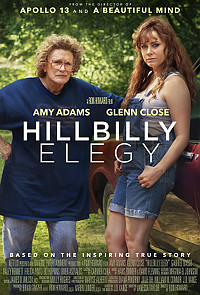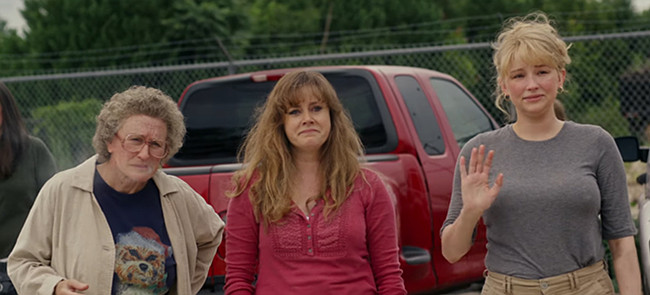| SHADOWS ON THE WALL | REVIEWS | NEWS | FESTIVAL | AWARDS | Q&A | ABOUT | TALKBACK | |||||
|
Hillbilly Elegy
Review by Rich Cline |
| |||||
 dir Ron Howard scr Vanessa Taylor prd Brian Grazer, Ron Howard, Karen Lunder with Amy Adams, Glenn Close, Gabriel Basso, Haley Bennett, Freida Pinto, Bo Hopkins, Owen Asztalos, Jesse C Boyd, Stephen Kunken, Keong Sim, Morgan Gao, Ethan Suess release US/UK 24.Nov.20 20/US Netflix 1h56 


Is it streaming? |
 Based on author JD Vance's memoir, this film tries to celebrate American backwoods family values. But the emphasis on using violence and criminality to solve problems is worrying, as is director Ron Howard's tendency to punch-up the emotionality, both feel-good vibes and darker undertones. This badly blunts the script's observations about rural culture and leaves many of the most intense scenes feeling like unintentional comedy sketches. As Yale law student JD (Basso) returns home to Ohio, he remembers life as a teen (Asztalos) coming to terms with his mercurial, oft-married mother Bev (Adams), as well as the feisty Mamaw (Close) who helped raise him and his older sister Lindsay (Bennett). Growing up in such a chaotic situation certainly wasn't easy, as Bev refused to take responsibility for her outrageous behaviour, but JD managed to get out. And now after a heroin overdose, Bev's refusal to accept help threatens to derail JD's career path. So he has to make a difficult decision. With a complicated structure of flashbacks within flashbacks, Taylor's screenplay paints a broad portrait of how this family has passed its tight connections down through the generations, making it through difficult times because of their loyalty to each other. By contrast, friendships are disposable. Meanwhile in the present-day sequences, the film traces JD's adorable romance with Usha (Pinto) while he tries to get a legal internship. This includes some simplistic stereotyping, such as his bewilderment about too many forks at a fancy dinner and the funny way he says "syrup". Performances are lively and engaging, although everything is overwrought because the film centres on big moments. Adams and Close both give scene-chewing masterclasses as women with few filters and no self-awareness. As Bev, Adams is almost always throwing a histrionic fit, while Close's Mamaw offers piquant commentary. Playing more grounded roles, Basso and Bennett find engaging routes into their aspects of the story, as does Pinto as the outsider just learning about JD's background. Howard has never been a particularly subtle filmmaker, and every moment in this story is dialled up to full volume, which leaves the movie with little shape or momentum. The various points are made so forcefully that even the repeated mini-sermons about the value of taking care of family begin to ring false. This actually feels irresponsible, because the story could have made some important observations about America's working poor. Howard and Taylor have made a fine-looking movie with an adept cast, but they're not telling the truth.
R E A D E R R E V I E W S 
 Still waiting for your comments ... don't be shy.
Still waiting for your comments ... don't be shy.
|
||||
© 2020 by Rich Cline, Shadows on the Wall | |||||
| HOME | REVIEWS | NEWS | FESTIVAL | AWARDS | Q&A | ABOUT | TALKBACK | |||||

